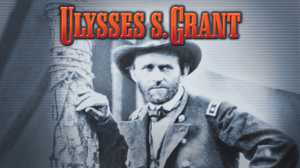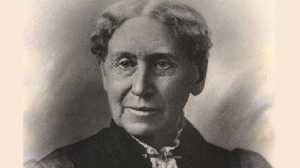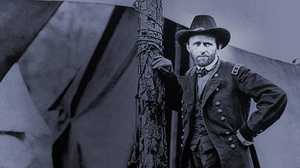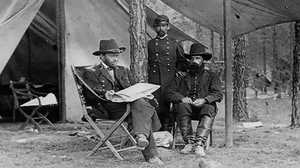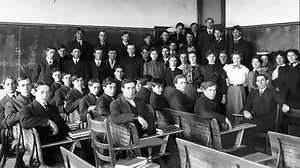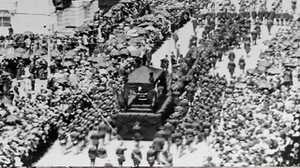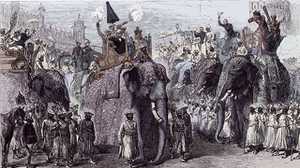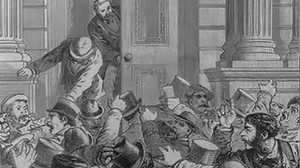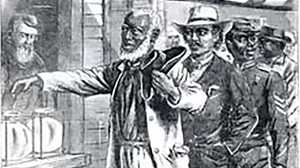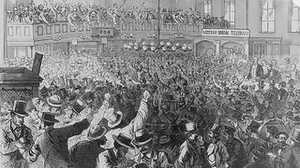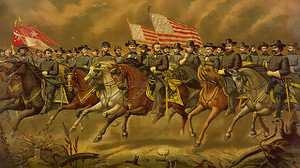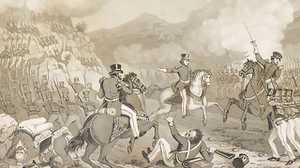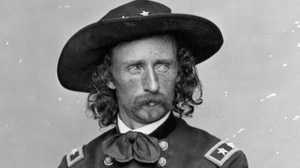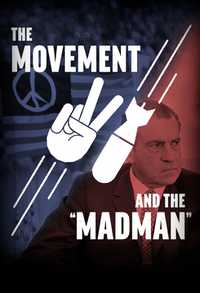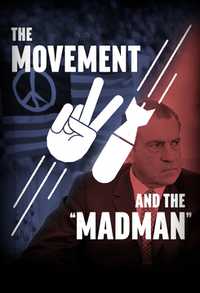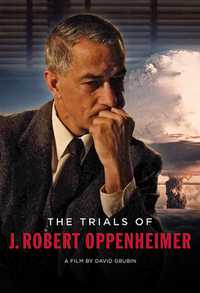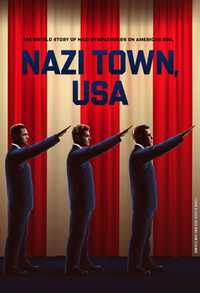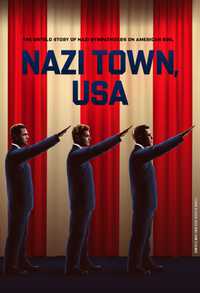Narrator: My family is American and has been for generations in all its branches, direct and collateral," he would write. Ulysses S. Grant grew up in the Ohio River Valley. His father, Jesse Root Grant, had arrived in Georgetown, Ohio in 1823, when Grant was one year old. He was the descendant of pioneers who had settled the western frontier.
"I attended the village schools," Grant said of his childhood. "I was not studious in habit, but never missed a quarter." When Ulysses was 16, he learned that his father had gotten him an appointment to the United States Military Academy at West Point.
John Y. Simon, Historian: Jesse Grant was the kind of man who would follow a dollar to hell. And when he learned about the possibility of sending his son to West Point at government expense, he jumped at the opportunity. It was only when the appointment was a sure thing that he finally told Ulysses that he's going to West Point. Young Grant said, "I won't go." And Jesse said, "You will."
Narrator: When Ulysses Grant arrived at West Point, he stood five feet one inch, and weighed just 117 pounds. "I had a very exalted idea of the requirements necessary to get through," he wrote. "I did not believe I possessed them, and could not bear the idea of failing." Grant was out of place in the West Point cadet's world of military drills, crossed belts, and gleaming brass.
Max Byrd, Novelist: He didn't have the military bearing. When Grant was a student at West Point, they were still talking about the famous cadet who had gone through 10 years earlier without a single demerit. A record I think that still stands. And that was Robert Lee. And Grant was the very opposite of that. He slouched, he cut classes, he stayed in his room.
Narrator: Grant placed 21st in a class of 39. Years later, one classmate remarked, "no one could possibly be more surprised than myself at Grant's amazing success." In 1846, Grant was called to duty when an expansionist United States went to war with Mexico over disputed territories in the Southwest.
Max Byrd, Novelist: Mexico was crucial for Grant as in some ways it was crucial for the whole country. For the coming Civil War it was a kind of trial run or training run for many of the officers, north and south.
Narrator: In Mexico, Grant served as a quartermaster, managing supply trains and transportation in a hostile, unfamiliar country.
Brooks D. Simpson, Historian: He understood the importance of supply and logistics, but he did not like being left behind with the mules and ammunition et cetera. He wanted to be at the front lines. So whenever gunfire would open, Grant would somehow find his way to the front.
Narrator: In Monterey, American troops were pinned down and running out of ammunition. The brigade commander asked for a volunteer. Grant quickly stepped forward. Hanging off the side of his horse, using it as a shield, Grant rode through the town, past the bullets and artillery of the Mexican army.
Geoffrey Perret, Biographer: Grant was good at this, because he kept his head. And Grant never seems to have felt fear of being harmed or being killed. He found the drama of war absolutely compelling. But the carnage, the suffering, were simply appalling. He was horrified at bloodshed.
Narrator: "City of Mexico, September 1847. My Dearest Julia, some of the hardest fought battles that the world has ever witnessed have taken place, and the most astonishing victories have crowned the American arms. But dearly have they paid for it. The loss of officers and men is frightful. I am getting very tired of this war and particularly of being separated from one I love so much."
Ulysses Grant had met Julia Dent two years before going to war while on a visit to White Haven, the Dent family plantation just outside St. Louis.
Geoffrey Perret, Biographer: She was 18 years old. She had a very sheltered life. She was plump, she had strabismus - one eye was slightly turned. Therefore there was not lots of competition for Julia's hand. But beyond that, Grant and Julia had something in common: they both loved horses, they both loved riding horses. Julia was a strong and skillful rider.
Narrator: Julia had been raised with the pretensions of southern aristocracy. Her father, "Colonel" Dent, owned some 20 slaves at his sprawling, though not very prosperous, Missouri plantation.
Max Byrd, Novelist: Frederick Dent was a self-nominated colonel. He was pro-slavery. And he didn't think much of Grant. He didn't think Grant had a future in the army.
Narrator: Colonel Dent refused to give his daughter's hand to a soldier with few prospects, and only relented when Grant had been at war for more than a year.
Geoffrey Perret, Biographer: Once Grant had decided that he wanted Julia for his wife, he was determined to see this campaign through to the end. No matter what the obstacles, no matter how long it took. His tenacity was extraordinary.
Narrator: Seven months after the U.S. defeated Mexico, Ulysses and Julia were married in St. Louis, at the Dent's winter home. Jesse and Hannah Grant did not attend.
Max Byrd, Novelist: When Grant married Julia, she inherited I think five or seven slaves. And Grant's father, the abolitionist, really couldn't forgive Ulysses' connection to a slaveholding family. So it was a great source of tension.
Narrator: Julia and Ulysses had been together four years when Grant was ordered to leave for the Pacific Northwest. With a young boy, Fred, and another child on the way, Grant had to leave Julia behind. He tried every scheme imaginable to make money and bring his family out West. He shipped ice from Alaska to San Francisco; the ice melted on the way. He planted potatoes; they rotted in a flood. He invested $1500 in a store in San Francisco; it went bankrupt. In 1854, Grant was transferred to Fort Humboldt, a remote post on the northern California Coast. It was at Humboldt that Ulysses S. Grant acquired a reputation that would haunt him for the rest of his life.
William S. McFeely, Biographer: He was intensely lonely and he ran into a very autocratic martinet of an officer that made him miserable. Depression was very serious. He was not riding his horse. He was staying in the barracks. And he was really in very bad shape.
Geoffrey Perret, Biographer: He got drunk for two reasons. One, because he missed his wife tremendously and felt very lonely when she wasn't around. And secondly, if Grant had two drinks, he got drunk. It's not that he drank a lot. Grant could get drunk on very little. And people noticed it.
Narrator: On April 11th, 1854, yearning to return to his family, Captain Ulysses Grant resigned from the United States Army. It was rumored that whiskey had cost him his commission. Grant was 32 when he returned to Missouri, ready, as he said, "to commence a new struggle for our support." He accepted an offer from Julia's father to farm land at White Haven. Grant built their first home with his own hands and called it "Hardscrabble." He was proud of it but Julia found it homely and crude, a far cry from the comforts of White Haven. With the help of the Dent family slaves, and one slave of his own, Grant set to work clearing the land to plant oats, corn, and potatoes. But just as he failed as a businessman, he also failed as a farmer. He eventually had to abandon Hardscrabble. Ulysses S. Grant arrived in Galena, Illinois in the spring of 1860, to begin a new life working at his father's harness and leather shop. Grant worked as a clerk, hoping some day to be made a partner like his younger brother Orvil. But for now, he mostly totaled up the bills.
Max Byrd, Novelist: Under his father's thumb and his brother Orvil's thumb, too, I don't think Grant was very happy at all in those early Galena days. But he was desperate, he had to take care of his family.
Narrator: In the evenings, he would read the news out loud to Julia. 1860 was an election year, and the papers were filled with reports of the growing national crisis over slavery and secession.
"I deplored the agitation of abolitionists," he later said, "but talk of dissolution of the Union made my blood run cold."
David Bradley, Writer: He was a reasonable man in an unreasonable time. This man had seen war. And unlike a lot of people who were agitating, he knew what secession would mean and he was not eager for that.
Narrator: Having lived among southerners, he knew secession was not an idle threat. "The South will fight," he predicted.
At four A.M., on April 12th, 1861, a Confederate artillery detachment opened fire on Fort Sumter in Charleston Bay, South Carolina. The next day, news that war had broken out reached Grant in Galena. "There are but two parties now," Grant wrote his father, "Traitors and Patriots, and I want hereafter to be ranked with the latter. We have a government, laws and a flag, and they must all be sustained."
Dan T. Carter, Historian: This is a man who was not involved in politics before the war, didn't even vote that often. For him, it was a simple matter, and that was as it was for many northerners, the protection, the defense of the Union.
Narrator: Convinced he'd be much in demand, he wrote Army headquarters in Washington, asking to be commissioned as a Colonel. He received no reply. He went to Missouri to appeal to two Mexican War veterans, but was rebuffed by both. He went to see General George B. McClellan, whom he had met in the Pacific Northwest. McClellan would not see him.
Max Byrd, Novelist: The label of the drinking quartermaster had stuck pretty hard and nobody in the beginning was interested in giving Grant a command at all of any kind.
Narrator: Finally, Grant was given a commission. He was put in charge of the 21st Illinois Infantry, an unruly group of Midwestern farm boys, who had driven their first commander into retirement.
James M. McPherson, Historian: Somehow Grant had the ability to exert this authority without shouting, without waving his hands, without threatening. And these men recognized that. And within days, Grant had changed these farmboys in the 21st Illinois, who had spent most of the time since they enlisted raising hell and getting drunk, into something representing a real regiment.
Narrator: Grant soon had a chance to test his men, and himself. He was ordered to advance on a Confederate regiment in Missouri, commanded by Colonel Thomas Harris. As he approached the enemy, Grant later recalled, "my heart kept getting higher and higher until it felt as though it was in my throat." But as the Confederate camp came within view, he saw that the rebels, hearing of the Yankee advance, had left. "It occurred to me that Harris had been as afraid of me as I had been of him."
James M. McPherson, Historian: Grant learned from that experience that the person who attacks first, the person who seizes the initiative, is going to have the advantage.
Narrator: It was a lesson he would never forget.
On July 31st, 1861, President Lincoln appointed Ulysses S. Grant Brigadier General. Grant sat for a photograph to send to Julia. The appointment came as a surprise. Lincoln needed generals and Grant’s name had been submitted by the Congressman from Galena. For his portrait, a proud Grant wore his full dress uniform, with sword, sash, and three ostrich plumes. But Grant would rarely again display any signs of rank beyond the requisite shoulder stars. Appearances, he believed, mattered little; what mattered is what happened on the battlefield.
General Grant got his first important command in Cairo, Illinois, a dreary but strategic city at the intersection of the Ohio and Mississippi Rivers. From Cairo, fighting his way down America's great rivers, Grant would make his reputation as a warrior.
Donald L. Miller, Historian: Grant's a Midwesterner, or a Westerner, as they called them then. And these people moved on rivers. He understands the flow of those rivers is the life flow of the country. And if you can control that river, you have an unfettered supply line all the way back to Cairo and from Cairo by rail to St. Louis and Chicago. Troops, material, nursing, everything can come down that river. And Grant very early on, at the very beginning of the war, sees that this is how the South can be taken. By using these river systems that the South is trying to defend.
Narrator: Grant was growing restless at Cairo, impatient to begin his offensive. "Let us go by all means," he told his commanders, "the sooner the better."
On February 6th, 1862, at Grant's urging, a flotilla of newly-built Union ironclad gun ships was ordered to attack Fort Henry, 125 miles Southeast of Cairo on the Tennessee River. After just two hours of fierce shelling, the Confederates surrendered Fort Henry, and retreated to Fort Donelson. "Fort Henry is ours," Grant telegraphed his superior, General Henry Wager Halleck, and without awaiting further orders added, "I shall take and destroy Fort Donelson." One week later, Union gunboats shelled Fort Donelson from the river, while Grant encircled it from the rear, blocking every avenue of escape. At four A.M. on the 16th, the Confederate Commander at Donelson, Simon Bolívar Buckner, who had been with Grant at West Point and Mexico, asked for terms of surrender. Grant's reply would become a legend: "No terms except unconditional and immediate surrender can be accepted. I propose to move immediately upon your works."
Max Byrd, Novelist: Mark Twain liked that so much he copied it out and carried it around in his wallet for years and would take it out and read it to people. It's written the way Grant ran an army: direct, hard, blunt, and no questions about it.
Narrator: The North had its first great victory. And a hero. "Who is this man Grant, who fights battles and wins them?" one reporter asked. His initials, U.S., suggested an answer: "Unconditional Surrender" Grant.
Mark Grimsley, Historian: It had a nice sound to it. The capture of some 12,000 Confederates, by a general who had, in effect, the panache to get them to surrender on terms that were unconditional, was something that was very exciting in the North.
James M. McPherson, Historian: Grant's success in capturing Fort Henry and capturing Fort Donelson came like a shot in the arm to Northern morale and almost overnight made Grant famous. The success that he enjoyed in capturing a whole Confederate army bred in Grant a feeling that the confederacy was something of a hollow shell, and maybe one more push and it would collapse.
Narrator: On April 6th, 1862, Grant's Army was camped on the Tennessee River, near a church called Shiloh. At his headquarters, nine miles away, Grant made plans to deliver what he thought would be the decisive blow against the Confederacy. The Confederates were planning an offensive of their own. At dawn, Rebels, in the tens of thousands, burst out of the woods at Shiloh, surprising Grant's troops and overrunning their camps. Grant arrived at the front at eight that morning to find his army on the verge of collapse.
Mark Grimsley, Historian: He finds the rear area in complete disarray. Hundreds, if not thousands, of men cowering under the bluffs. A situation that suggests that a complete disaster has occurred.
Brooks D. Simpson, Historian: He's going from commander to commander, moving up reinforcements, arranging for supplies, rallying men, giving up ground inch by inch in a stubborn effort to hold on.
Narrator: At one point he came under fire. One bullet barely missed him. Another grazed his horse. A third struck his sword scabbard. Through it all, Grant remained unperturbed.
Brooks D. Simpson, Historian: He knows reinforcements are on the way. He believes the Confederates cannot maintain the sort of attack that they've initiated earlier that morning. He knows that if men can stand their ground until dusk that he will prevail eventually at Shiloh.
Narrator: That evening, the flash of Union gunboats shelling Confederate positions revealed the aftermath of battle. The Union Army had taken a terrible beating. Kept awake by the blast of cannons, Grant sought refuge under an oak tree, then in a log house which had been turned into a field hospital. "The sight was more unendurable than encountering the enemy's fire," he later wrote, "and I returned to my tree." Grant's most aggressive general, William Tecumseh Sherman, who commanded a division at Shiloh, approached.
Brooks D. Simpson, Historian: Sherman's been under fire all day, and by the end of April 6th, he's convinced that the time has come to retreat from the field. But as he sees Grant, something in him says, "Don't give that kind of advice." He walks up to his friend, looks him in the eye, and says, "Well, Grant, we've had the Devil's own day, haven't we?" Grant takes a puff of his cigar, looks up, and says, "Yup. Lick 'em tomorrow, though."
Narrator: The next day Grant’s battered army, reinforced overnight, recaptured the bloody ground lost the day before. But at a price Grant could not have imagined. "I saw an open field in our possession, so covered with dead that it would have been possible to walk across the clearing, in any direction, stepping on dead bodies, without a foot touching the ground."
As casualty lists began to appear in newspapers, the public was horrified. The two days of fighting had left more dead than all the battles previously fought on American soil. 24,000 casualties in all. It took a mile of trenches to bury the dead.
James M. McPherson, Historian: Shiloh does provide a turning point. In Grant's own mind, it convinces him that the Confederacy is not the hollow shell about to collapse that he had thought after his relatively easy victories at Fort Henry and Fort Donelson. I think it also shocks a lot of the northern people into an awareness that if they are going to win this war, it's going to be a victory that comes at very high cost.
Geoffrey Perret, Biographer: Nobody had expected a bloodletting like that. Certainly northern public opinion hadn't anticipated it. There was no preparation for that kind of carnage. Someone had to be blamed for such an enormous loss of life, and the person they blamed was Grant.
Narrator: "Such amazing blundering and gross negligence was probably never before heard of in the history of war, " one newspaper declared. "Here is a case that calls loudly, peremptorily for a Court Marshal." Six weeks earlier he had been "Unconditional Surrender Grant," the victorious hero of Donelson. Now he was "Butcher Grant," the incompetent commander of Shiloh. It was even rumored he had been drunk the night before the battle. It cost him his command. Although Grant had averted disaster at Shiloh, all General Halleck could think of was the carnage of the first day.
James M. McPherson, Historian: General Halleck became convinced that Grant really couldn’t manage a large army and that he had been surprised. And so Halleck came personally to Pittsburgh landing to take control. And basically put Grant on the shelf by naming him to the meaningless post of Second in Command.
Max Byrd, Novelist: That pattern of his early adulthood that he thought was broken, he's a general now, thought that's all over, the pattern of continual failing, of downward spiraling. And now he's gone up high to command and only to go down again.
Narrator: Confined to his headquarters, without an army of his own, Grant wrote in despair: "My position differs but little from one in arrest. I owe it to myself to ask either full restoration to duty or to be relieved entirely."
In the summer of 1862, the war was not going well for the North. In the West, the Union advance had ground to a halt. In the East, the Union Army had been driven from the gates of Richmond all the way back to Washington. Frustrated, President Abraham Lincoln reshuffled his generals. Grant was restored to command. That fall, Grant led his Army of the Tennessee into the heart of cotton country, setting in motion a revolution that would shatter the foundations of the Old South.
"I am extended now like a peninsula into an enemy's country," he wrote. "Territory occupied by people terribly embittered and hostile to us." Confederate guerrillas destroyed his rail lines and supply depots, slowing his advance. Civilians laid mines and spied for the Confederacy. It was a desperate fight to preserve a way of life. As word of the Union advance reached plantations in Louisiana and Mississippi, thousands of slaves rushed toward Grant's lines.
Clarence E. Walker, Historian: The coming of the Union army is heralded both in black folklore and in black religious expression as a moment of liberation, of a coming of redeemers to save them from bondage. But it also carries with it a recognition, too. And many parts of this army of liberation is also comprised of soldiers, in some cases, who were very hostile to these people. Why are we freeing them? This is not a war about slavery, this is a war to preserve the Union.
Narrator: At first, Grant turned the fugitive slaves away, fearing they would overwhelm his lines. "I have no hobby of my own in regard to the Negro," he had said to his father, "either to effect his freedom or to continue his bondage."
John Y. Simon, Historian: Grant has the problem that every commander has of not knowing exactly how to deal with the slaves who were fleeing to his army. And Grant himself as a former slaveholder and as the husband of somebody who continued to hold slaves and who in fact had brought them into Mississippi, is not one from whom one would expect an enlightened attitude towards this tremendous influx. And yet it comes.
David Bradley, Writer: I think he realized, as everybody with a brain did, that slavery was over, and you would have to do something with the slaves. What are you going to do? You have to put them to work. He saw people coming into his lines. They needed to be fed, work needed to be done. Hey, let's use them. Why not? But there were all kinds of people who would have erected barriers, who would have said, "Oh, they can't do it. Oh, they don't have the capacity." And Grant said, "Okay. Put them to work. If they can't work, they can't work. We'll find out." And he was very frank about saying that, which was not what people did in the 19th Century.
Narrator: Grant set up camps where former slaves would help provide for their own care by harvesting cotton and corn from nearby abandoned plantations under the supervision of Union authorities.
Donald L. Miller, Historian: The idea in mind as Grant explained it is that if we can begin to show the American public that black slaves can act in a responsible fashion, can take care of themselves economically, can become self-sufficient, maybe the attitudes, the racial attitudes of Americans will change. This is important because it shows that Grant is fighting in a sense against slavery not just to hurt the South. When you take slaves away from the South, you strike at the economic vitals of the South. But he also, you know, has I think a sense that something has to be done for these recently freed people. They just can't be left alone.
Narrator: President Lincoln's Emancipation Proclamation took effect on January 1st, 1863. Freed slaves began to be inducted into the Union Army. At first, Grant doubted the newly armed soldiers could be trusted in the front lines and confined them to garrison duty. But when he heard of their fierce defense of a Union camp at Milliken's Bend in Louisiana, the general slowly began to change his mind. "By arming the negro, we have added a powerful ally," Grant wrote Lincoln. "They will make good soldiers, and taking them from the enemy, weakens him in the same proportion they strengthen us."
Joan Waugh, Historian: It seemed to him that it was an important part of Union strategy to use the slaves against their former masters. And he very much agreed with Lincoln on that. And in the process of forming black regiments and watching them in action, he came to respect the right of black people to demand political equality.
Narrator: But even as he dealt with the social revolution the Civil War had unleashed, Grant never lost sight of his main objective: the capture of Vicksburg, a Confederate stronghold and the last obstacle to the Union's control of the Mississippi River. If Vicksburg fell, Grant knew, the Confederacy would be split -- the armies in the East cut off from their vital supplies of food and soldiers in the West. "Vicksburg is the key," Lincoln had said, "the war cannot be won until the key is in our pocket." The problem was that Vicksburg was nearly impregnable.
Donald L. Miller, Historian: It sits high on bluffs, 200 feet high above the Mississippi, on a hairpin turn in the Mississippi River so that vessels coming down river have to make a very sharp turn and slow down. And as they go past Vicksburg, say a Union gunboat, has to go by about seven miles of fire. North of Vicksburg, there's the delta which runs almost all the way up to Memphis. And that's just a semi-tropical swamp filled with sluggish meandering streams, alligators. And when you're in there, you feel like you're in, as it were, the heart of darkness.
Narrator: Grant realized trying to take city by frontal assault from the river was virtually impossible. So that winter, he desperately tried to find an alternate route through the Mississippi Delta. He tried cutting a canal to bypass Vicksburg. He blew a hole in a levy to open an old steamboat route. He ordered his army to clear a path through the thickness of the Delta. Nothing worked. Midwestern farm boys, eager to fight rebels found themselves dredging mud, and sawing trees eight feet underwater. Camped in pestilential swamps, drinking contaminated water, exposed to swarms of mosquitoes, soldiers were dying from malaria, dysentery, and smallpox.
"Go any day down the levee," one soldier wrote home, "and you could see a squad or two of soldiers burying a companion, until the levee was nearly full of graves and the hospitals full of sick."
Donald L. Miller, Historian: It was a horrible situation and these guys had no sense that they were going anywhere. They were literally stuck in the mud.
Narrator: As winter came to an end, Grant had yet to move on Vicksburg. Hungry for victory, the northern public turned on him. The press renewed the campaign of criticism it had begun at Shiloh. "Our noble army is being wasted by the foolish, drunken, stupid Grant," wrote the influential editor of the Cincinnati Commercial. "Grant will fail miserably, hopelessly, eternally."
Even Lincoln began to doubt his general. "I think General Grant has but one friend left," the President said, but he also sent a spy to Vicksburg to report on Grant’s progress, and particularly on his drinking. Fearing her husband was in danger of losing his command, Julia urged him to take Vicksburg by direct assault. "Mrs. Grant," Ulysses responded, "I will move upon Vicksburg and I will take it too. You need give yourself no further trouble."
Donald L. Miller, Historian: He had a clear plan, a clear idea of how to take this place. He would move south along the Louisiana shore, take his army down there, and then send supply ships and gunboats past the Vicksburg batteries. They would unite with his armies south of Vicksburg and ferry that army across the Mississippi on dry ground and come in behind Vicksburg. That's a great plan. It's an audacious plan. It's one of the riskiest plans of the Civil War.
James M. McPherson, Historian: Grant by this stage of the war, even though he was being subjected to all kinds of criticism, he maintained confidence in himself. He maintained confidence in his ability to make the right kinds of decisions and carry them out. When everybody else, Sherman, others, were telling him, "You ought not to do this," he decided that this is what he wanted to do. This is what he needed to do.
Donald L. Miller, Historian: Grant's whole career is on the line here. If he doesn't take Vicksburg, he's done. But more is at stake at Vicksburg than the reputation and career of Grant. What's at stake here is the very war itself, whether the North will win or lose this thing.
Narrator: On the evening of April 16th, Union ironclads quietly approached Vicksburg. Confederate pickets spotted their dark shapes and set bonfires to light the night. The batteries opened fire. For more than two hours, the fleet withstood the barrage -- 525 rounds of artillery that set the Mississippi ablaze. Then, a little after midnight, the batteries fell silent. The fleet had made it through. On April 30th, three days after Grant's 41st birthday, his 40,000 troops boarded the transports south of Vicksburg and were ferried across the mile-wide river. "I felt a degree of relief scarcely ever equaled since," Grant later wrote. "I was on dry ground, and on the same side of the river with the enemy."
Donald L. Miller, Historian: He's now in Mississippi. He's behind enemy lines. He's between two armies, two Confederate armies, one in Vicksburg and one at Jackson. He's almost cut off completely from his supply lines and cut off completely from his communication lines.
Narrator: As his army moved across Mississippi, foraging teams took livestock, chickens, whiskey, grain from Mississippi gristmills -- all they needed to survive.
James M. McPherson, Historian: This is a pivotal moment in the war. This was the first time a major field army had deliberately cut itself off from its base of supplies and lived off the enemy's country.
Narrator: Whatever was not of use was put to the torch. Southerners watched in terror as the Union Army destroyed plantations, cotton gins, factories, railroads - everything of value to the South. "It is our duty to use every means to weaken the enemy," Grant explained to his officers.
Dan T. Carter, Historian: There was tremendous fear. Once Union armies began moving into the South, it's no accident that thousands, those who can take to the roads, refugees, by the tens of thousands, whites, begin moving to try to get away from the Union's armies. But many poor southerners can't and have to stay. And it's difficult to recreate today what it must have been like, living in a society in which law has ended, the confederate troops have retreated. You're sitting there waiting, knowing that the Union armies are on your doorstep, and anticipating, really, the worst.
Narrator: Grant ordered his armies to march first toward Jackson and then west, to approach Vicksburg from behind. In less than three weeks, Grant's army marched 180 miles and fought and won five battles, forging a bond with its commander that deepened with each victory.
Donald L. Miller, Historian: There's this sense that there's the guy who's behind it all. There's the guy that we're going to follow. And if we follow him, he has the chance to be, as interestingly one of the troops says, he has the chance in this campaign to be another George Washington. They all had that sense of destiny. They really had this sense that this was the most important campaign of the Civil War and that this general was going on to greatness.
Narrator: "Grant moves with his shoulders thrown back, his left hand in the pocket of his pantaloons, his eyes thrown straight forward, and a countenance drawn into furrows of thought," one reporter noted. "The soldiers observe him coming, and rising to their feet, gather to see him pass. They only watch him with a certain sort of familiar reverence."
"'Good morning, General. Pleasant day, General.' They greet him as they would address one of their neighbors, never embarrassed by the thought that they are talking to a great general."
On May 18th, Vicksburg came within sight of Ulysses S. Grant, riding in advance of his troops. His army had driven the Confederates into their fortifications. Twice the general ordered his men to break through the well-entrenched Confederates; twice they failed. Grant, however, remained confident. "The enemy is within our grasp," he wrote Washington, "the fall of Vicksburg can only be a question of time."
Joan Waugh, Historian: Grant's army began to lay siege to Vicksburg, cutting off all communication and food supplies. Starving the residents out.
Narrator: Forced underground to avoid the constant shelling, living on a diet of mule meat and pea bread, the people of Vicksburg endured the siege.
Dan T. Carter, Historian: This is, in a sense, the first modern war, in which, although there may have been lip service given to the protection of civilian rights, it was understood, particularly, I think, on the part of both Grant and Sherman, that in order for the war to be successfully carried out, it wasn't simply a war against the opposing army. It had to be a war which demoralized, which broke the back of the will of the South to resist.
Narrator: As the siege dragged on, Grant grew restless. On June 6th, anxious that the Confederates might be preparing an offensive against his rear, he took a reconnaissance trip up the Yazoo River. By some accounts, what happened aboard his steamer bore out the warnings of Grant’s harshest critics.
Donald L. Miller, Historian: Well there was a lot of controversy as to whether or not during a crucial moment in the Vicksburg campaign he went on a drinking spree. The heroic, in a sense, image of Grant is he might have been a drinker, but he never drank at strategic moments in a military campaign. And a guy by the name of Cadwallader who covered his campaign said that's wrong he was drinking at that point. We'll never know. All the evidence is in. Their stories contradict one another and collide with one another. We don't have a smoking gun.
Narrator: On July 4th, after 47 days of siege, starved and without hope of reinforcements, Vicksburg's 30,000 defenders surrendered. "The Stars and Stripes are now waving," an exuberant Union captain wrote his wife. "The Confederacy is divided. The Mississippi River is opened and General Grant is to be our next President."
Donald L. Miller, Historian: Vicksburg elevates Grant to preeminence among Union generals. I mean, he's clearly Lincoln's man from now on. He's the guy who has the stick-to-itness and, in a sense, the genius to defeat the South.
Narrator: Four months later, Grant won yet another decisive victory at Chattanooga, Tennessee. He had completed the campaign begun with the capture of Fort Donelson less than two years before. The South now lay open to conquest. On December 7th, Abraham Lincoln called for a national day of prayer and wrote Grant, "I wish to tender you and all under your command my profoundest gratitude."
On March 8th, 1864, Ulysses S. Grant and his 13-year-old son Fred arrived at the Willard Hotel, the political epicenter of Washington. Grant was in Washington on official business. He was to be named General in Chief of all Union armies, and to be commissioned as a lieutenant general - the first officer to hold that rank since George Washington.
Geoffrey Perret, Biographer: One of the great ironies of democracies is that we believe that the destiny of the nation is in the hands of the citizens. But at the same time, there is a hankering for a savior. Especially when times are hard.
Narrator: Grant's star had risen so high since the fall of Vicksburg the previous summer that he was being seriously considered as a candidate for the presidency. Grant dismissed the talk as preposterous. "I am not a politician, never was, and never hope to be," he said. The only office he desired, Grant joked, was Mayor of Galena, "so I could build a new sidewalk from my house to the depot." The afternoon of his arrival in Washington, he attended Lincoln's weekly White House reception.
William S. McFeely, Biographer: His entrance was just politically brilliant. Imagine this in our time. He walks around to the White House. And he's waited; he doesn't get there early. He goes in and he stands at the door very simply. And Lincoln spots him. They have never met.
James M. McPherson, Historian: Both of them were Midwesterners. Both of them were, in a way, self-made men. They'd come up from an unprivileged childhood. They had made their way in the world. They had overcome adversity. There was a spark of understanding between them.
Narrator: "This is General Grant, is it not?" Lincoln said in greeting. He then led the General to the East Room.
Max Byrd, Novelist: There was a clamorous uproar, people grabbing his hand, shaking his hand. It looked as if he were going to be pulled apart. And finally Secretary of State Seward put him on top of a sofa so that everybody could just look at Grant as he stood there most uncomfortably being looked at and looking down at everybody around him.
Narrator: The next day, as he accepted his promotion to Lieutenant General, and the responsibility of command of all the Armies of the Union, Grant spoke with humility: "With the aid of the noble armies that have fought in so many fields for our common country, it will be my earnest endeavor not to disappoint your expectations."
Two weeks later, Julia and the children joined him in Washington. With his new commission came a salary of $12,000 per year, guaranteed for life. The misery of Humboldt, the penury of Hardscrabble, and the humiliation of Galena were all behind him. Grant could now provide for his family without depending on his father or Colonel Dent. He had but one regret: he was now part of the world of Washington, of the "show-business" of politics he said he despised.
On May 4th, 1864, Ulysses S. Grant, the fourth General to command the Armies of the Union in three years, crossed the Rapidan River in Virginia, to begin what the North hoped would be the decisive campaign of the Civil War. "Grant's very vigor inspires the public confidence to a reasonable anticipation of quick work and great results," wrote the New York Herald. "If with General Grant at the head we cannot put the rebellion down in the coming summer, we can never put it down."
James M. McPherson, Historian: Coming off of the euphoria of the successes in 1863, there was a feeling of great confidence in the North that now, finally, we're going to be able to prosecute this war to imminent victory, and this cruel war will soon be over.
Narrator: With a northern public impatient for victory, Grant called for an all out offensive to bring the Confederacy to its knees. Five columns would take the war into the South in a well-coordinated plan. His old friend, William Tecumseh Sherman, would march Grant’s western armies toward Atlanta. "I will make Georgia howl," he vowed. Grant would lead the Army of the Potomac toward Richmond, the Capital of the Confederacy, and fight against Robert E. Lee.
For three years, Lee, a Southern gentleman and legendary West Point cadet, had defeated every Union General who had dared cross into Virginia. Among his men he inspired blind, almost religious devotion. His opponents thought he was invincible. Grant, who had never lost a battle, thought otherwise: "I had known Lee personally," he said, "and knew that he was mortal." He intended to crush Lee's Army and end the war by November. The only doubt in his mind concerned the new army under his command.
Mark Grimsley, Historian: The Army of Potomac was used to getting beaten by Lee at every turn and thought it was doing well if it could hold its own against Lee. It didn't have the killer instinct that was characteristic of the armies that Grant had commanded in the West.
Narrator: The morning of May 5th, General Ulysses S. Grant awoke to the sound of gunfire. Soon word came that his army had collided with Lee's in a nearby thicket. After issuing orders, Grant lit a cigar, took out his penknife, and began to whittle.
Brooks D. Simpson, Historian: The whittling is a sign of anxiety. He whittles so fiercely that he cuts apart those kid gloves that he's wearing. He's smoking so hard to repress his anxiety that he goes through two dozen cigars in one day. He's a very anxious man, very worried, not because of anything that Robert E. Lee's doing but rather because he's worried that the Army of the Potomac is not going to respond to his command.
Narrator: It was called the Battle of the Wilderness. 70,000 Union men engaged 40,000 Confederates in some of the fiercest combat of the Civil War.
Max Byrd, Novelist: They were tangled in brush almost from the beginning and it was hard to know who was who. The smoke was thick and the woods caught on fire from the cannons and the muskets almost at once. So that addition of fighting the enemy, they were fighting the fire itself.
Mark Grimsley, Historian: Many wounded were either burned alive or were seen to actually cock their rifle muskets and place them up against their heads, ready to pull the trigger if the flames got too close. It was, by any criterion, an unusually horrible battle. And it was worse than anything that Grant had seen in the Western theatre.
Narrator: As the fighting subsided, an officer claimed he saw the General "throw himself face down on his cot and give way to the greatest emotion, stirred to the very depths of his soul."
Donald L. Miller, Historian: In battle, Grant hardly concerned himself with the issue of losses. But as even he says in his memoirs, when the battle was over, it was very hard to take in what had happened as you walked across a battlefield filled with corpses and men who are still alive and barely breathing. He said, "after the battle you begin to think about what has happened, and the costs and consequences."
Narrator: On May 7th, the battle of The Wilderness came to an end. It appeared that Lee had gotten the better of Grant. The Union had suffered nearly 18,000 casualties, the Confederates fewer than 12,000. The Army of the Potomac awaited the order to retreat. Three times, they had crossed the Rapidan and three times they had been ordered back. They saw no reason why this time it should be different. That evening, Grant approached the 2nd Corps of the Army of the Potomac, camped along a road. As he rode by, the men broke into a cheer. He was not headed north, back to Washington, but south, toward Richmond.
John Y. Simon, Historian: They had figured out that Grant had no intention of disengaging with Lee. That this would be the last campaign of the Army of the Potomac. And that this was going to be a campaign that would end in victory one way or another.
Max Byrd, Novelist: In that moment, I think you saw almost all of Grant's character. He was in motion as he liked to be. He was on a horse, as he loved to be. And he was not retracing his steps, he was going forward. There was no retreat in him.
Narrator: As Grant continued to push south, his army and Lee's became locked in a desperate, deadly embrace.
Dan T. Carter, Historian: Lee came to appreciate the fact that he was up against a great general. You see this in his dispatches, and you see it in his comments to his fellow officers. He knew Grant was good. He knew he was up against, as he said, a worthy adversary.
Narrator: "Dear Julia, The world has never seen so bloody or so protracted a battle as the one being fought and I hope never will again."
In one month of fighting, Grant lost 44,000 men - almost half of those who had crossed the Rapidan were dead, missing, or wounded. Yet as long as he closed in on Richmond, even at a frightful cost, the morale in the North remained high. "Great confidence is felt in Grant," Secretary of the Navy Gideon Welles noted, "but the immense slaughter of our men sickens us all."
On the 21st of May, the general and his officers met just outside Spotsylvania for a rare council of war. Sitting on pews borrowed from a nearby church, Grant planned his next move.
Mark Grimsley, Historian: He believed that Lee's Army of Northern Virginia was on the ropes. And that one more good, hard shove would break through Lee's army and enable the Army of the Potomac to get on to Richmond which was, at that point, less than 10 miles distant.
Narrator: "I may be mistaken but I feel our success is already insured," he wired Washington. Grant ordered the Army of the Potomac to smash through Lee's forces at a crossroads known as Cold Harbor.
Max Byrd, Novelist: The Cold Harbor battlefield is just an open field. It looks like three or four football fields wide and long. And at one end of that, at the Southern end, there are the built up ditches and trenches where the Confederates were behind great mounds of dirt with their rifles and muskets just pointed. And at the other end, coming down from the North, there was a line of Union troops. Line after line really. And the order was simply for them to charge straight ahead across this wide open expanse.
Narrator: At 4:30 A.M. on June 3rd, 60,000 Union Soldiers attacked across a seven-mile front. The waiting Confederates replied with a fusillade so fierce, windows were said to have rattled in Richmond. "The division in front seemed to melt away like snow falling on moist ground," a Union soldier recalled. In less than two hours, the Army of the Potomac had suffered over 6,000 casualties. That night, Grant told his officers, "I regret this assault more than any one I have ever ordered." "There had been butchery at Cold Harbor," he later said. Not because of the blood shed, but because it was shed in vain, "to no advantage whatsoever." He compounded his mistake by leaving hundreds of wounded men howling in the hot June sun while he exchanged letters of terms with Lee.
William S. McFeely, Biographer: Both Lee and Grant, in my view, behaved very badly indeed. Neither one of them would admit that he’d been defeated. And, so, neither one would send in a white flag that would enable them to get out to these wounded men who were wailing out there in the hot June sun, waiting for relief.
Narrator: Four days after the assault, Grant finally relented and called for a cease-fire. When Union litter-bearers climbed out of their trenches, they found only two men still alive amongst the piles of rotting corpses. Even as he witnessed the horror of his blunder, Grant took time to write his little daughter. "Cold Harbor, Virginia, June 4th, 1864. My Dear Little Nelly, I received your pretty, well-written letter more than a week ago. I know that you have been representing 'the Old Woman that lived in a Shoe' at the Fair. I know you must have enjoyed it very much."
Geoffrey Perret, Biographer: The guilt that Grant felt over Cold Harbor was enormous. The strain on him was unbearable. And writing a letter to a child was a complete escape from that.
William S. McFeely, Biographer: He could see the battle, and then he could turn away from it and see his daughter. He was able to compartmentalize in that way. That was the way he kept going. I think that sustaining private life was immensely important to him, and whatever happened in his public life was a whole other world.
Narrator: "Be a good little girl as you have always been. Study your lessons. From, Papa."
Max Byrd, Novelist: After Cold Harbor, all of the things that had first been said after Shiloh, that Grant was a butcher, that he was incompetent, that he was a drunkard, all of that came back with renewed force and real hatred. Mary Lincoln was practically shrieking in the White House that Grant was a butcher and that Lincoln should remove him because he was so cruel and hard.
Brooks D. Simpson, Historian: There were soldiers who after this began to believe that the entire campaign was one of endless, ceaseless, bloody assaults that always were futile. And that Grant had no creativity as a general whatsoever except at expending human life.
Narrator: Grant maneuvered his force around Lee to attack Petersburg, a rail center just south of Richmond. But his troops were too tired and demoralized to press an assault. Many refused to follow orders. "I have never seen an army so haggard and worn, so worked out and fought out, so dispirited and hopeless," one officer wrote. "Grant has pushed his army to the extreme limit of human endurance." Unable to take Petersburg, Grant settled in for a siege. "This is likely to prove a very tedious job I have on hand," he wrote Julia. "The enemy keeps himself behind strong entrenchments all the time and seemed determined to hold on to the last." He knew Lee was playing for time.
James M. McPherson, Historian: Lee's strategy in 1864 is to hold out long enough and inflict heavy enough casualties on the enemy so that by the time the presidential election in November the Northern people will have become so weary of the war and so disillusioned with the possibility of victory that they would elect a Democrat, turn Lincoln out of office and negotiate an armistice and withdrawal of Northern troops would mean the Confederacy had won this war.
Narrator: Each day Lee held on, Lincoln's prospects for re-election dimmed. By August 1864, he was convinced he would be defeated in November. The strain on Grant was plain to see: "the saddened eyes, the worn face, the mouth that shut down tightly all around," one officer observed. "He carried the Union on his back."
Geoffrey Perret, Biographer: Grant was extremely frustrated. He knows that he has to produce a victory to secure Lincoln's reelection. Time is running out.
Narrator: Finally on September 4th, good news reached Grant. Sherman had taken Atlanta, ransacked it and then burnt it to the ground.
Brooks D. Simpson, Historian: Sherman's victory was the vindication of Grant's overall campaign plan in 1864. All of those armies, moving simultaneously against a common center. Somewhere Grant knew the Confederacy would crack. It cracked at Atlanta. Sherman may have achieved that victory, but in the end, it was according to Grant's design.
Narrator: "In honor of your great victory I have ordered a salute to be fired from every battery bearing upon the enemy," Grant wired his old friend. "It will be fired within an hour amidst great rejoicing."
That November, Lincoln won re-election. The South had been denied its last opportunity for victory. Grant, a staff officer reported, was back "in good health and buoyant spirits," ready to prosecute the war to what he now knew was its inevitable conclusion.
In March 1865, after a nine-month siege, Grant's headquarters at City Point, Virginia were busy. Preparations were underway for the final Union assault on Petersburg. But at Grant's cabin, life followed the domestic routine of a family in peacetime. Julia had come to City Point earlier that year and settled in with Ulysses. "I am snugly nestled away in my husband's log cabin," Julia wrote a friend. "Am I not a happy woman?"
Brooks D. Simpson, Historian: An officer one time comes upon the two of them holding hands. They're startled, Grant grows red-faced, because that was a private domestic moment, the kind of expression of love that many people did not see because Grant wanted to conceal his true feelings from outsiders.
Narrator: Ulysses could often be found wrestling with his youngest boy, Jesse. "You know my weaknesses," he explained, "my children and my horses." At his wife's prompting, Grant invited the President to City Point for a few days, suggesting that the rest would do him good. On the 24th, Lincoln arrived at City Point aboard the steamer the River Queen. The President looked over plans and conferred with his generals. In the steamer's state room, they discussed the end of the war and the beginning of the peace.
Joan Waugh, Historian: And all were agreed it should be an easy peace. Very, very much predicated on the idea that while the Southerners had to swear an oath of allegiance to get back into the Union, they had to accept emancipation, but that everything else should be easy.
Donald L. Miller, Historian: The South had to be put down brutally, aggressively, and in the fastest fashion possible. But once that happened, he's thinking like a soldier here. You make peace. You put the saber down and you don't put in place policies that are going to alienate the South. You want to reunite the sections.
Narrator: As they planned reunification, the three men set aside the central question before them and the nation: the fate of more than 4 million former slaves the war had freed.
On April 2nd, Grant's forces finally broke through the Confederate entrenchments ringing Petersburg, the last obstacle to victory. The next day, the Confederates abandoned Richmond, but not before setting ablaze the capital that had been the symbol of the rebellion.
April 9th, 1865, Palm Sunday. Ulysses S. Grant went out for a ride. He had slept poorly, tortured by a migraine headache, exhausted from his week-long pursuit of Lee. His head was still pounding when an aide delivered him a note. "The instant I saw the contents, I was cured," he later said. Lee had agreed to surrender. That very afternoon, General Ulysses S. Grant and General Robert E. Lee met at a house in Appomattox. Anyone trying to discern from appearances which man was the victor and which the vanquished, would likely have been deceived. Six feet tall and erect in bearing, Lee arrived in full dress uniform, with sash and jeweled sword; five feet eight, with stooped shoulders, Grant appeared in his field uniform, with mud-spattered trousers tucked inside his muddy boots.
Clarence E. Walker, Historian: He looks just like a common guy, you know. His shirt's unbuttoned, his coat looks like it's a bit frayed, he has his hat off. You wouldn't have thought of him, I think, as a General, you would have thought of him as some kind of ordinary soldier.
William S. McFeely, Biographer: It was, symbolically an immensely telling thing. This was the success of folks of ordinary America over, some perhaps mythical sense of aristocracy.
Max Byrd, Novelist: It does seem as if the cast-iron Grant changed, or he put off that armor. And he went into Appomattox in a mood of generosity, and mildness. He seems to have been extraordinarily sensitive to Lee's feelings.
Narrator: Grant tried to break the ice, reminding Lee they had met in Mexico. Lee vaguely remembered the encounter. After several minutes, they got down to the business at hand. Grant's terms were generous: there would be no reprisals or treason trials, officers and men could go home "not to be disturbed by U.S. authority so long as they observe their paroles and the laws in force where they may reside."
"I felt sad and depressed," Grant recalled, "at the downfall of a foe who had fought so long and valiantly, and had suffered so much for a cause, though that cause was, I believe, one of the worst for which a people ever fought and for which there was the least excuse." As news of the surrender spread through Union camps, batteries began firing joyful salutes. Grant ordered them stopped at once. "The war is over," he said, "the Rebels are our countrymen again."
